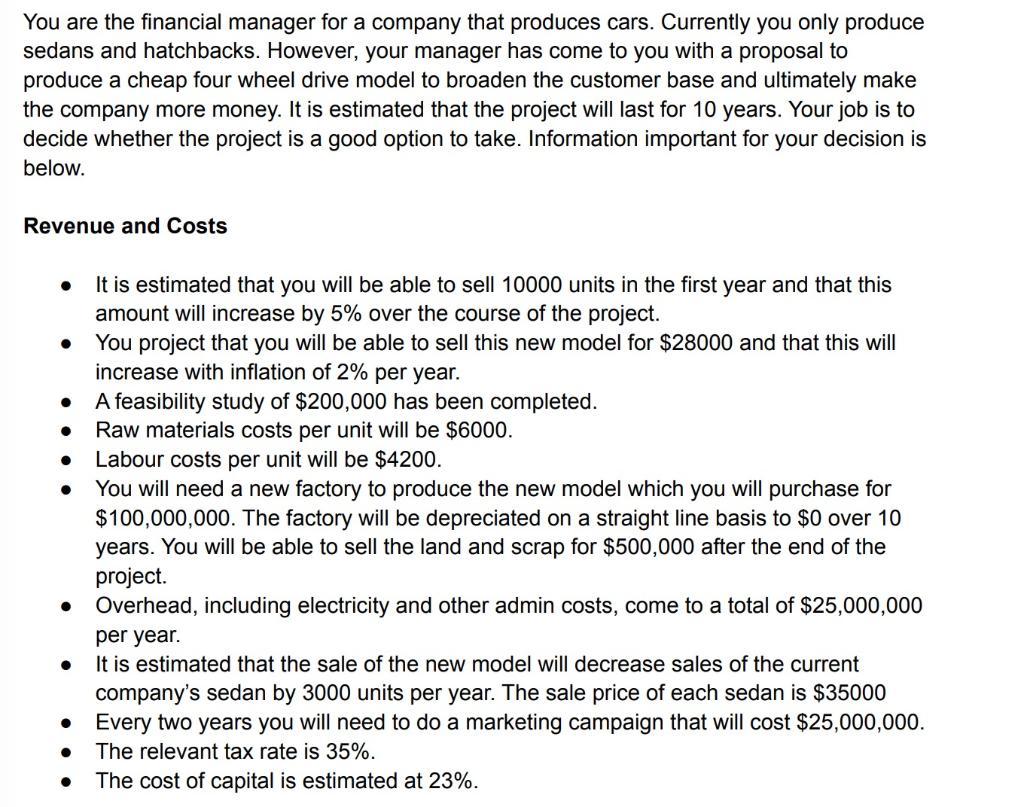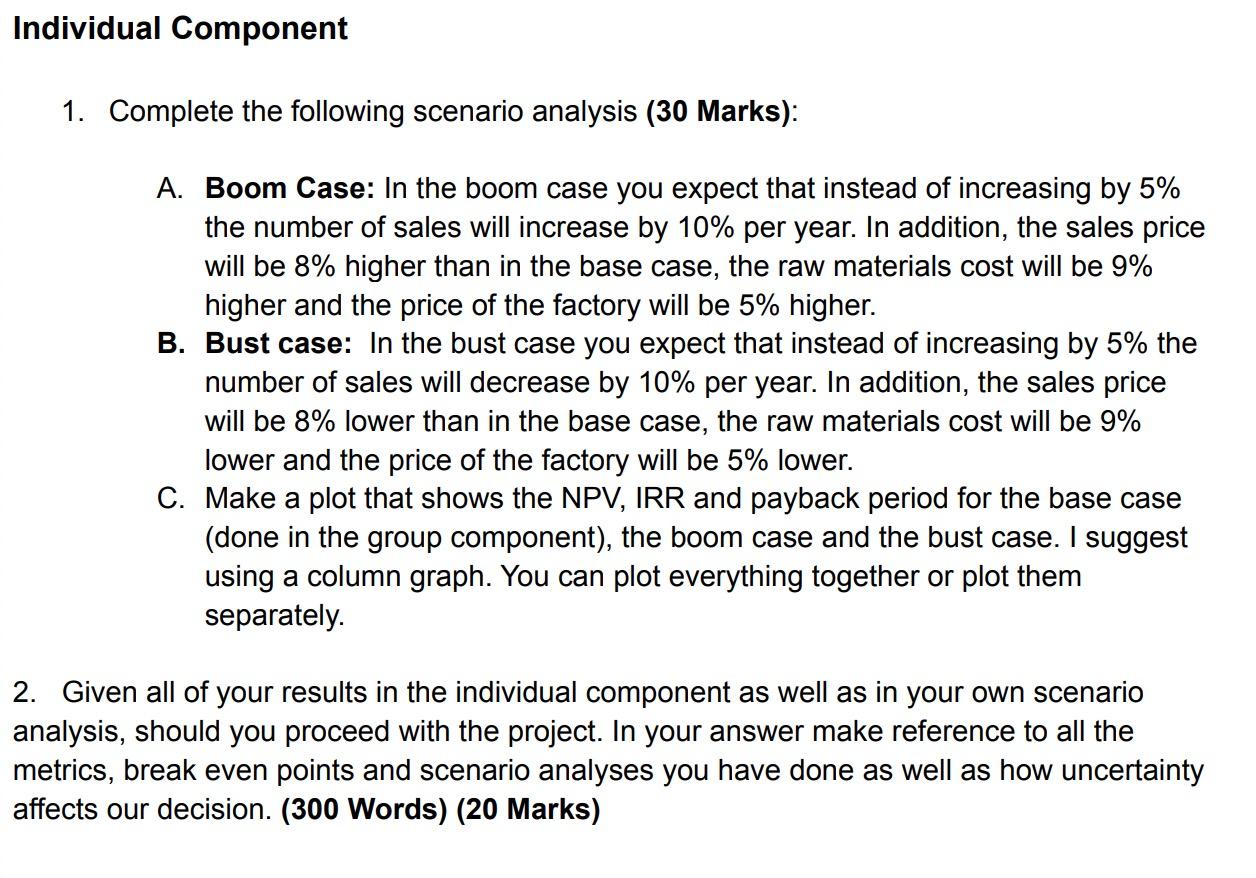

You are the financial manager for a company that produces cars. Currently you only produce sedans and hatchbacks. However, your manager has come to you with a proposal to produce a cheap four wheel drive model to broaden the customer base and ultimately make the company more money. It is estimated that the project will last for 10 years. Your job is to decide whether the project is a good option to take. Information important for your decision is below. Revenue and Costs . . . It is estimated that you will be able to sell 10000 units in the first year and that this amount will increase by 5% over the course of the project. You project that you will be able to sell this new model for $28000 and that this will increase with inflation of 2% per year. A feasibility study of $200,000 has been completed. Raw materials costs per unit will be $6000. Labour costs per unit will be $4200. You will need a new factory to produce the new model which you will purchase for $100,000,000. The factory will be depreciated on a straight line basis to $0 over 10 years. You will be able to sell the land and scrap for $500,000 after the end of the project Overhead, including electricity and other admin costs, come to a total of $25,000,000 per year. It is estimated that the sale of the new model will decrease sales of the current company's sedan by 3000 units per year. The sale price of each sedan is $35000 Every two years you will need to do a marketing campaign that will cost $25,000,000. The relevant tax rate is 35%. The cost of capital is estimated at 23%. . . . Individual Component 1. Complete the following scenario analysis (30 Marks): A. Boom Case: In the boom case you expect that instead of increasing by 5% the number of sales will increase by 10% per year. In addition, the sales price will be 8% higher than in the base case, the raw materials cost will be 9% higher and the price of the factory will be 5% higher. B. Bust case: In the bust case you expect that instead of increasing by 5% the number of sales will decrease by 10% per year. In addition, the sales price will be 8% lower than in the base case, the raw materials cost will be 9% lower and the price of the will be 5% lower. C. Make a plot that shows the NPV, IRR and payback period for the base case (done in the group component), the boom case and the bust case. I suggest using a column graph. You can plot everything together or plot them separately. 2. Given all of your results in the individual component as well as in your own scenario analysis, should you proceed with the project. In your answer make reference to all the metrics, break even points and scenario analyses you have done as well as how uncertainty affects our decision. (300 Words) (20 Marks) You are the financial manager for a company that produces cars. Currently you only produce sedans and hatchbacks. However, your manager has come to you with a proposal to produce a cheap four wheel drive model to broaden the customer base and ultimately make the company more money. It is estimated that the project will last for 10 years. Your job is to decide whether the project is a good option to take. Information important for your decision is below. Revenue and Costs . . . It is estimated that you will be able to sell 10000 units in the first year and that this amount will increase by 5% over the course of the project. You project that you will be able to sell this new model for $28000 and that this will increase with inflation of 2% per year. A feasibility study of $200,000 has been completed. Raw materials costs per unit will be $6000. Labour costs per unit will be $4200. You will need a new factory to produce the new model which you will purchase for $100,000,000. The factory will be depreciated on a straight line basis to $0 over 10 years. You will be able to sell the land and scrap for $500,000 after the end of the project Overhead, including electricity and other admin costs, come to a total of $25,000,000 per year. It is estimated that the sale of the new model will decrease sales of the current company's sedan by 3000 units per year. The sale price of each sedan is $35000 Every two years you will need to do a marketing campaign that will cost $25,000,000. The relevant tax rate is 35%. The cost of capital is estimated at 23%. . . . Individual Component 1. Complete the following scenario analysis (30 Marks): A. Boom Case: In the boom case you expect that instead of increasing by 5% the number of sales will increase by 10% per year. In addition, the sales price will be 8% higher than in the base case, the raw materials cost will be 9% higher and the price of the factory will be 5% higher. B. Bust case: In the bust case you expect that instead of increasing by 5% the number of sales will decrease by 10% per year. In addition, the sales price will be 8% lower than in the base case, the raw materials cost will be 9% lower and the price of the will be 5% lower. C. Make a plot that shows the NPV, IRR and payback period for the base case (done in the group component), the boom case and the bust case. I suggest using a column graph. You can plot everything together or plot them separately. 2. Given all of your results in the individual component as well as in your own scenario analysis, should you proceed with the project. In your answer make reference to all the metrics, break even points and scenario analyses you have done as well as how uncertainty affects our decision. (300 Words) (20 Marks)








